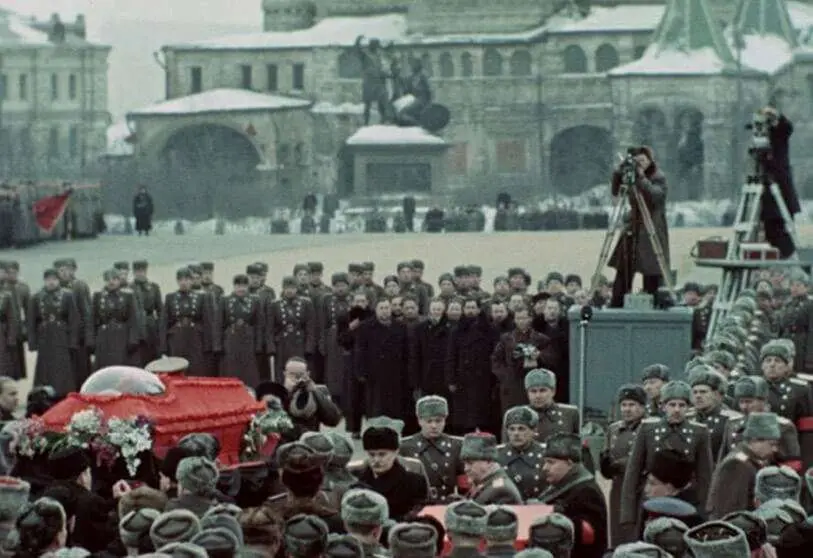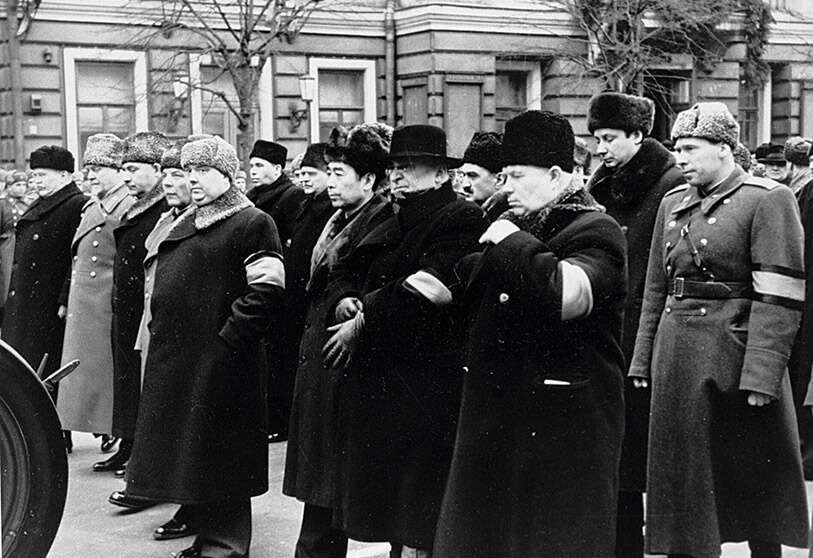Loznitsa and the Burial of the Soviet Empire

If anyone can play all four corners in the coming war, it is Sergey Lozanitsa. Born in Belarus, raised in Ukraine, a student in Russia and now living in Lithuania, he is a clear product of the now decaying Soviet puzzle that Putin is trying to rebuild. Loznitsa is now in Madrid presenting an already long documentary filmography, which looks like a catalogue of the detritus of life under the Cold War. On a freezing night, his masterpiece "Funeral of State" is shown at the Filmoteca de Madrid, a priceless parade of models in coats and hats from the '53 season, under which a few tears escape, whether for the late Stalin or for the beginning of the end that was already in sight: the slow agony of the Soviet empire.
When Stalin died, the propaganda machine was set in motion with no means spared. State radio took over all the channels and began a series of messages to the people, who gathered in masses around the squares with loudspeakers followed everything from details of the medical report to slogans about the certain victory of communism and the goodness of the comrade beloved throughout the world. The zealously programmed popular reactions were portrayed by the best cameras and film directors of the time and turned into a film to remember: The Big Goodbye.

The film never saw the light of day. When Loznitsa embarked on a project to recover the state funerals of various figures of the time, he discovered that from Stalin's funeral alone there were piles of boxes stored with more than 40 hours of footage. "Making a film of a dead man and keeping the attention is no easy task," admits Sergei, who has made a meticulous and orderly reconstruction of the massive celebrations, mass movements, wreath bearers and mass farewell gatherings across the length and breadth of the Soviet Union, from Moscow to Vladivostok. Also arriving are the leaders of sister parties, from Hungary, from the GDR, from Poland.... and Chu En Lai from Mao's China and a peculiar representation from the Communist Party of the United Kingdom.
There is no narration, only the words of the radio announcers who tirelessly extol in language as bombastic as it is hollow the goodness of what turned out to be one of the greatest mass murderers in history. For two and a half hours we witness the arrival of the followers and penitents in the hall of the trade union building, including the foreign delegations (including Dolores Ibárruri accompanied by Victor Claudin), the numerous military, the bureaucrats and the common people to pay their respects to the dead man, who is finally carried on the shoulders of the politburo to his resting place in the mausoleum under the Kremlin wall next to Lenin. So much pomp and circumstance, driven here to ecstasy by Tchaikovsky's Sixth, culminates in speeches under the snow by Khrushchev (master of ceremonies) and Beria (the brutal head of the NKVD).
The buffoon Nikita Khrushchev (as Loznitza calls him) would unexpectedly seize power, while Lavrenti Beria (the ruthless one, who would be accused of even killing Stalin) was made to disappear from the map....; and Yossif Vissarionovich Dzhugashvili, better known as Joseph Stalin was left with a funeral, but no film and even no space in the Lenin mausoleum from which he would soon be removed by night.
So involved is Putin in restoring the territorial grandeur of the empire of the tsars - which the communist alibi consecrated as Soviet - that the contemplation of this funeral makes clear both the interest of half of Russia in feeling imperial and that of the other half in seeing itself as a victim of inordinate anxieties.
Lonita, our man between the four corners, does not take national sides, he does not want to because for him "my homeland is the school where I was educated, not a nation". A nomad in his youth, he is also a nomad now and lives between Vilnius, Berlin and Amsterdam, while the drums of war accompany him or chase him wherever he goes.
I wondered if Putin - whom I imagine dreaming of a fancy funeral after his unlikely demise - had seen his film, and Sergei replied that "he's too busy holding the whole globe on his shoulders". He also remarked, I don't know whether with verisimilitude or derision, that the current Russian leader would have said that "after Gandhi's death, I have no one to talk to". The hollow proclamations that accompanied the leader's unconscionable last farewell are today trumped up as fake news in the renewed propaganda apparatus.
The dream and nightmare of the Soviet Union is thus still present, among those who long for it and those who hold it. Contemplating the megalomania of a broken empire at the funeral of the most vile of its leaders, airing nonsense and endless praise, makes us think that if wild dreams take precedence over reality, any kind of dislocation is possible. Even war.










